高一英语动名词练习题(含答案)
- 格式:doc
- 大小:58.00 KB
- 文档页数:16
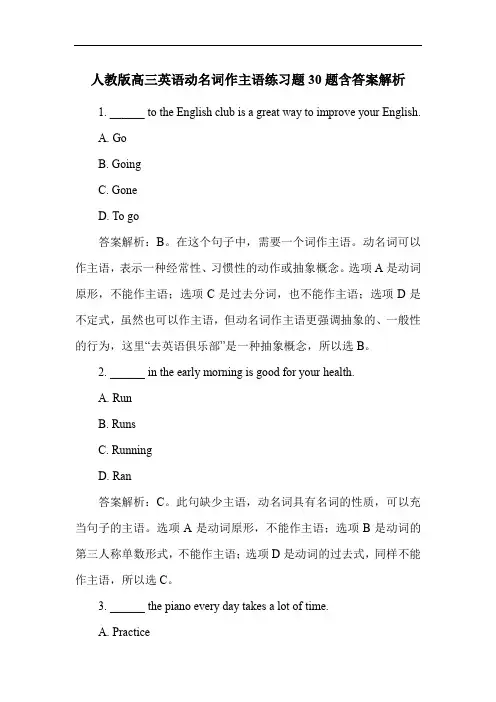
人教版高三英语动名词作主语练习题30题含答案解析1. ______ to the English club is a great way to improve your English.A. GoB. GoingC. GoneD. To go答案解析:B。
在这个句子中,需要一个词作主语。
动名词可以作主语,表示一种经常性、习惯性的动作或抽象概念。
选项A是动词原形,不能作主语;选项C是过去分词,也不能作主语;选项D是不定式,虽然也可以作主语,但动名词作主语更强调抽象的、一般性的行为,这里“去英语俱乐部”是一种抽象概念,所以选B。
2. ______ in the early morning is good for your health.A. RunB. RunsC. RunningD. Ran答案解析:C。
此句缺少主语,动名词具有名词的性质,可以充当句子的主语。
选项A是动词原形,不能作主语;选项B是动词的第三人称单数形式,不能作主语;选项D是动词的过去式,同样不能作主语,所以选C。
3. ______ the piano every day takes a lot of time.A. PracticeB. PracticesC. PracticingD. Practiced答案解析:C。
句子中缺少主语,动名词可以作主语,表示“每天练习钢琴”这个行为。
选项A是动词原形,不能作主语;选项B是动词的第三人称单数形式,不符合要求;选项D是过去式,也不能作主语,因此选C。
4. ______ with friends on weekends makes me happy.A. Hang outB. Hangs outC. Hanging outD. Hung out答案解析:C。
这里需要一个词作主语,动名词作主语表示一种行为或活动。
选项A是动词原形,不能作主语;选项B是动词的第三人称单数形式,不符合;选项D是过去式,不能作主语,所以选择C。
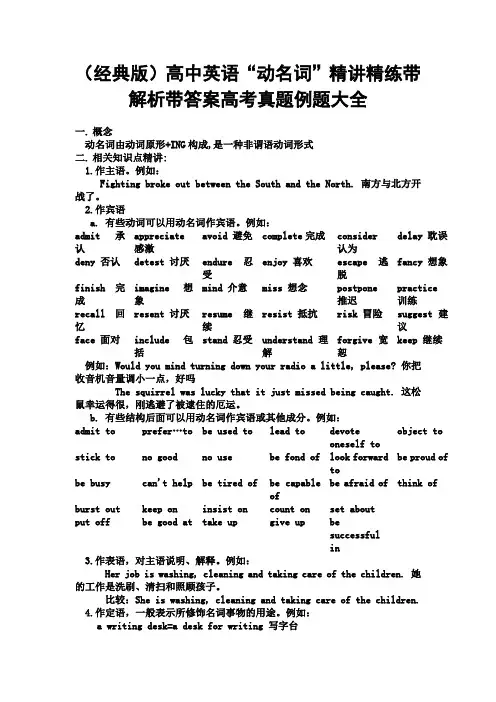
(经典版)高中英语“动名词”精讲精练带解析带答案高考真题例题大全一.概念动名词由动词原形+ING构成,是一种非谓语动词形式二.相关知识点精讲:1.作主语。
例如:Fighting broke out between the South and the North. 南方与北方开战了。
2.作宾语a. 有些动词可以用动名词作宾语。
例如:admit 承认appreciate感激avoid 避免complete完成consider认为delay 耽误deny 否认detest 讨厌endure 忍受enjoy 喜欢escape 逃脱fancy 想象finish 完成imagine 想象mind 介意miss 想念postpone推迟practice训练recall 回忆resent 讨厌resume 继续resist 抵抗risk 冒险suggest 建议face 面对include 包括stand 忍受understand 理解forgive 宽恕keep 继续例如:Would you mind turning down your radio a little, please? 你把收音机音量调小一点,好吗The squirrel was lucky that it just missed being caught. 这松鼠幸运得很,刚逃避了被逮住的厄运。
b. 有些结构后面可以用动名词作宾语或其他成分。
例如:admit to prefer…to be used to lead to devoteoneself toobject tostick to no good no use be fond of look forwardtobe proud of be busy can't help be tired of be capableofbe afraid of think of burst out keep on insist on count on set aboutput off be good at take up give up besuccessfulin3.作表语,对主语说明、解释。
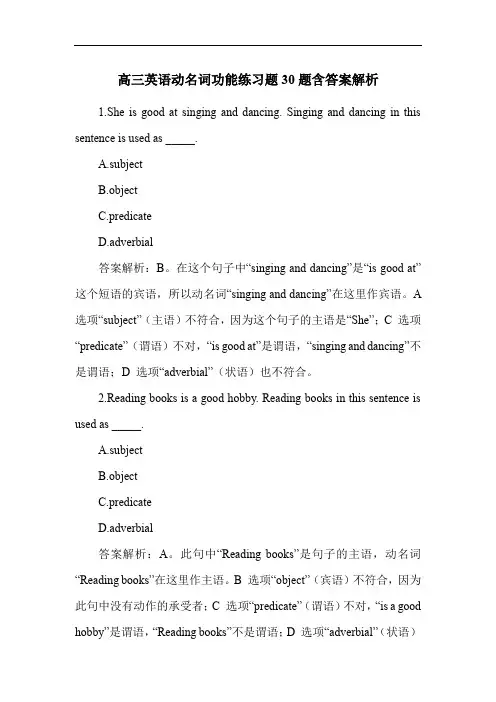
高三英语动名词功能练习题30题含答案解析1.She is good at singing and dancing. Singing and dancing in this sentence is used as _____.A.subjectB.objectC.predicateD.adverbial答案解析:B。
在这个句子中“singing and dancing”是“is good at”这个短语的宾语,所以动名词“singing and dancing”在这里作宾语。
A 选项“subject”( 主语)不符合,因为这个句子的主语是“She”;C 选项“predicate”(谓语)不对,“is good at”是谓语,“singing and dancing”不是谓语;D 选项“adverbial” 状语)也不符合。
2.Reading books is a good hobby. Reading books in this sentence is used as _____.A.subjectB.objectC.predicateD.adverbial答案解析:A。
此句中“Reading books”是句子的主语,动名词“Reading books”在这里作主语。
B 选项“object”( 宾语)不符合,因为此句中没有动作的承受者;C 选项“predicate”( 谓语)不对,“is a good hobby”是谓语,“Reading books”不是谓语;D 选项“adverbial”( 状语)也不符合。
3.He enjoys playing basketball. Playing basketball in this sentence is used as _____.A.subjectB.objectC.predicateD.adverbial答案解析:B。
在这个句子中“playing basketball”是“enjoys”这个动词的宾语,所以动名词“playing basketball”在这里作宾语。
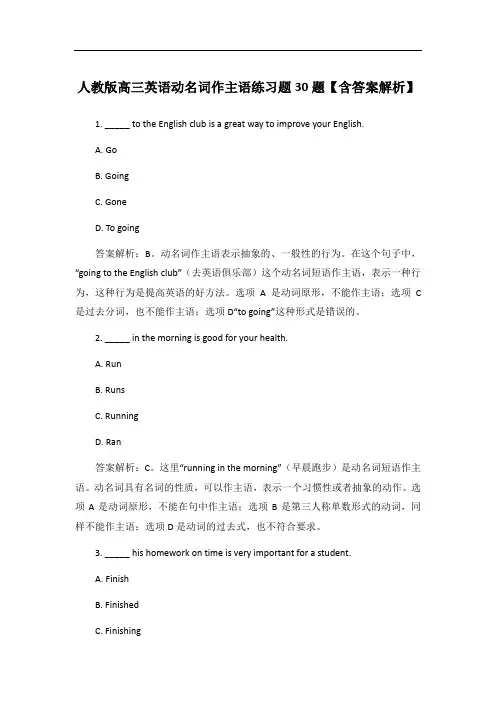
人教版高三英语动名词作主语练习题30题【含答案解析】1. _____ to the English club is a great way to improve your English.A. GoB. GoingC. GoneD. To going答案解析:B。
动名词作主语表示抽象的、一般性的行为。
在这个句子中,“going to the English club”(去英语俱乐部)这个动名词短语作主语,表示一种行为,这种行为是提高英语的好方法。
选项A是动词原形,不能作主语;选项C 是过去分词,也不能作主语;选项D“to going”这种形式是错误的。
2. _____ in the morning is good for your health.A. RunB. RunsC. RunningD. Ran答案解析:C。
这里“running in the morning”(早晨跑步)是动名词短语作主语。
动名词具有名词的性质,可以作主语,表示一个习惯性或者抽象的动作。
选项A是动词原形,不能在句中作主语;选项B是第三人称单数形式的动词,同样不能作主语;选项D是动词的过去式,也不符合要求。
3. _____ his homework on time is very important for a student.A. FinishB. FinishedC. FinishingD. To finishing答案解析:C。
“finishing his homework on time”(按时完成他的作业)是动名词短语作主语。
动名词作主语时,强调的是这个动作本身。
选项A是动词原形,不能作主语;选项B是过去分词,不能作主语;选项D“to finishing”形式错误。
4. _____ for others is a noble behavior.A. CareB. CaredC. CaringD. To care答案解析:C。
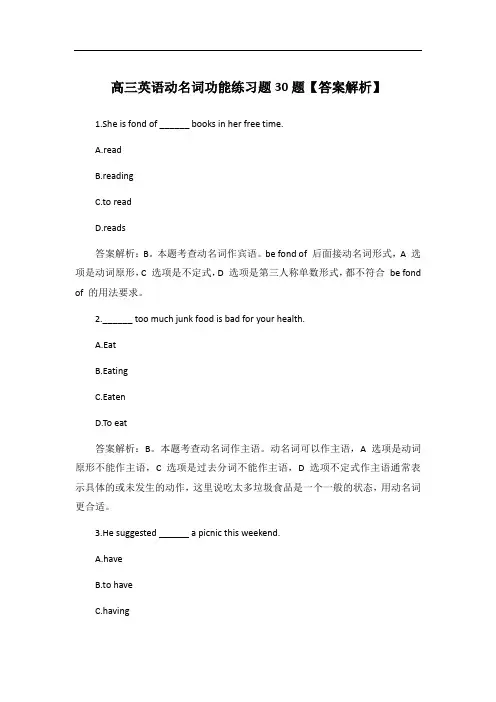
高三英语动名词功能练习题30题【答案解析】1.She is fond of ______ books in her free time.A.readB.readingC.to readD.reads答案解析:B。
本题考查动名词作宾语。
be fond of 后面接动名词形式,A 选项是动词原形,C 选项是不定式,D 选项是第三人称单数形式,都不符合be fond of 的用法要求。
2.______ too much junk food is bad for your health.A.EatB.EatingC.EatenD.To eat答案解析:B。
本题考查动名词作主语。
动名词可以作主语,A 选项是动词原形不能作主语,C 选项是过去分词不能作主语,D 选项不定式作主语通常表示具体的或未发生的动作,这里说吃太多垃圾食品是一个一般的状态,用动名词更合适。
3.He suggested ______ a picnic this weekend.A.haveB.to haveC.having答案解析:C。
本题考查动名词作宾语。
suggest 后面接动名词形式,A 选项是动词原形,B 选项是不定式,D 选项是过去式,都不符合suggest 的用法要求。
4.______ English every day is important for language learning.A.PractiseB.PractisingC.PractisedD.To practise答案解析:B。
本题考查动名词作主语。
动名词可以作主语,A 选项是动词原形不能作主语,C 选项是过去分词不能作主语,D 选项不定式作主语通常表示具体的或未发生的动作,这里说每天练习英语是一个一般的状态,用动名词更合适。
5.I enjoy ______ to music after a long day at school.A.listenB.listeningC.to listenD.listened答案解析:B。
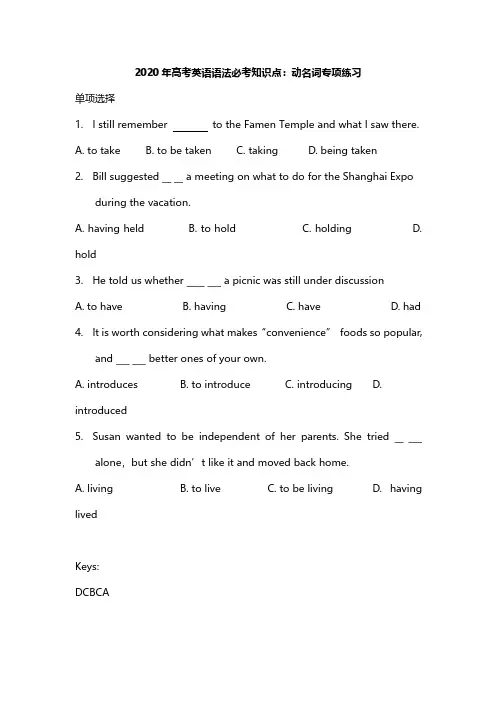
2020年高考英语语法必考知识点:动名词专项练习单项选择1.I still remember to the Famen Temple and what I saw there.A.to takeB.to be takenC.takingD.being taken2.Bill suggested____a meeting on what to do for the Shanghai Expoduring the vacation.A.having heldB.to holdC.holdingD. hold3.He told us whether_______a picnic was still under discussionA.to haveB.havingC.haveD.had4.It is worth considering what makes“convenience”foods so popular,and______better ones of your own.A.introducesB.to introduceC.introducingD. introduced5.Susan wanted to be independent of her parents.She tried_____alone,but she didn’t like it and moved back home.A.livingB.to liveC.to be livingD.having livedKeys:DCBCA句子翻译1)你介意把门打开吗?2)他花了三个小时完成作业。
3)看了这场表演,他情不自禁地笑了。
4)我们已经习惯早起早睡。
5)医生建议我要多喝水。
Keys:Would you mind opening the door?He spent three hours finishing the homework.Seeing the show,he can’t help laughing.We are used to getting up early and going to sleep early.The doctor suggests me drinking more water.动名词是表示动作的名词,既具有动词的一些特征,又具有名词的句法功能。
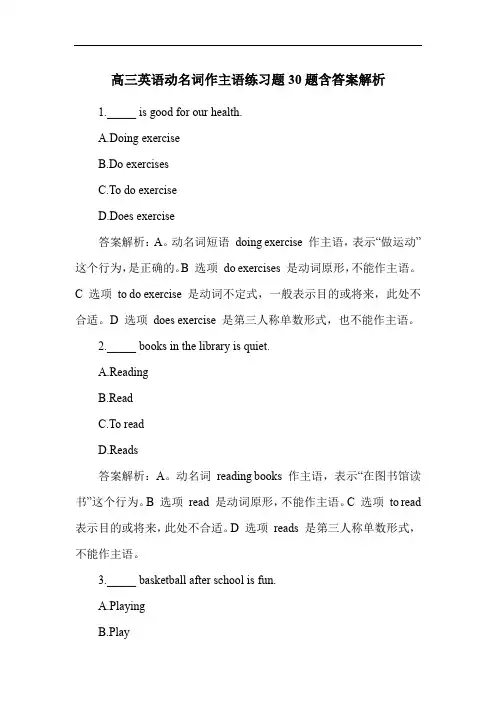
高三英语动名词作主语练习题30题含答案解析1._____ is good for our health.A.Doing exerciseB.Do exercisesC.To do exerciseD.Does exercise答案解析:A。
动名词短语doing exercise 作主语,表示“做运动”这个行为,是正确的。
B 选项do exercises 是动词原形,不能作主语。
C 选项to do exercise 是动词不定式,一般表示目的或将来,此处不合适。
D 选项does exercise 是第三人称单数形式,也不能作主语。
2._____ books in the library is quiet.A.ReadingB.ReadC.To readD.Reads答案解析:A。
动名词reading books 作主语,表示“在图书馆读书”这个行为。
B 选项read 是动词原形,不能作主语。
C 选项to read 表示目的或将来,此处不合适。
D 选项reads 是第三人称单数形式,不能作主语。
3._____ basketball after school is fun.A.PlayingB.PlayC.To playD.Plays答案解析:A。
动名词playing basketball 作主语,表示“放学后打篮球”这个行为。
B 选项play 是动词原形,不能作主语。
C 选项to play 一般表示目的或将来,此处不合适。
D 选项plays 是第三人称单数形式,不能作主语。
4._____ to music can relax us.A.ListenB.ListeningC.To listenD.Listens答案解析:B。
动名词listening to music 作主语,表示“听音乐”这个行为。
A 选项listen 是动词原形,不能作主语。
C 选项to listen 表示目的或将来,此处不合适。
D 选项listens 是第三人称单数形式,不能作主语。
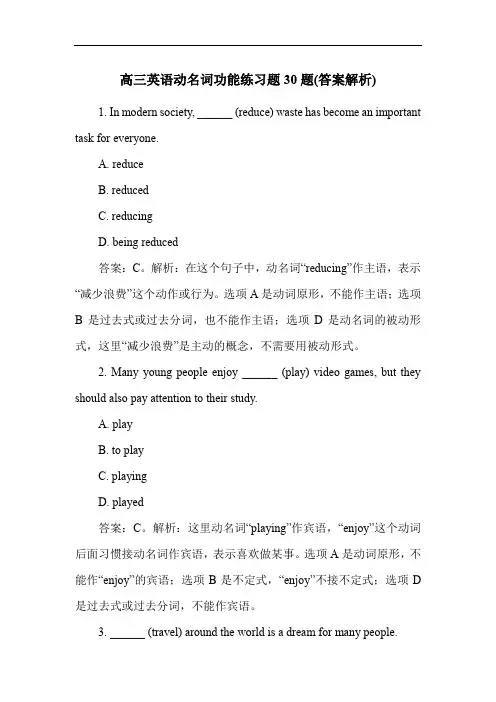
高三英语动名词功能练习题30题(答案解析)1. In modern society, ______ (reduce) waste has become an important task for everyone.A. reduceB. reducedC. reducingD. being reduced答案:C。
解析:在这个句子中,动名词“reducing”作主语,表示“减少浪费”这个动作或行为。
选项A是动词原形,不能作主语;选项B是过去式或过去分词,也不能作主语;选项D是动名词的被动形式,这里“减少浪费”是主动的概念,不需要用被动形式。
2. Many young people enjoy ______ (play) video games, but they should also pay attention to their study.A. playB. to playC. playingD. played答案:C。
解析:这里动名词“playing”作宾语,“enjoy”这个动词后面习惯接动名词作宾语,表示喜欢做某事。
选项A是动词原形,不能作“enjoy”的宾语;选项B是不定式,“enjoy”不接不定式;选项D 是过去式或过去分词,不能作宾语。
3. ______ (travel) around the world is a dream for many people.B. TraveledC. TravelingD. To travel答案:C。
解析:动名词“Traveling”作主语,表示“环游世界”这个行为。
选项A是动词原形,不能作主语;选项B是过去式或过去分词,不能作主语;选项D是不定式,虽然不定式也可以作主语,但动名词作主语更强调一般性、习惯性的动作,这里“环游世界是很多人的梦想”更强调这种行为本身,所以动名词更合适。
4. She doesn't mind ______ (work) overtime if she can get more pay.A. workB. to workC. workingD. worked答案:C。
高一英语动名词练习题(含答案)动名词专项练习题Ⅰ、单项选择:1.No one enjoys _______ at.A. laughingB. to laughC. being laughedD. to be laughed2.You must do something to prevent your house _______.A. to be broken inB. from being broken inC. to break inD. from breaking in3.They insisted on _______ another chance to try.A. givenB. givingC. being givenD. to be given4. --- Where is my passport? I remember _______ it here.--- You shouldn't have left it here. Remember _______ it with you all the time.A. to put;to takeB. putting;takingC. putting;to takeD. to put;taking5.His room needs _______, so he must have it _______.A. painting;paintedB. painted;paintingC. painting;paintingD. painted;painted6.After finishing his homework he went on _______ a letter to his parents.A. writeB. writingC. wroteD. to write7.The young trees we planted last week require _______ with great care.A. looking afterB. to look afterC. to be looked afterD. taken good care of8.Only _______ English doesn't mean _______ the language.A. to learn;to learnB. learning;learningC. learning about;learnD. learning about;learning 9.She returned home only to find the door open and something _______.A. missedB. to be missingC. missingD. to be missed10.She decided to devote herself _______ the problem of old age.A. to studyB. studyingC. to studyingD. study11.Remember _______ the newspaper when you have finished it.A. putting backB. put backC. to put backD. be put back12.As she is looking forward to _______ from me, please remember _______ this letter on your way to school. A. hear;post B. hearing;to post C. beheard;posting D. be hearing;to posting13.Grandma said that she had a lot of trouble _______ your handwriting.A. to readB. to seeC. reading C. in seeing14.Writing stories and articles _______ what I enjoy most.A. isB. areC. wasD. were15.We appreciate _______ us to the ball.A. them to inviteB. to inviteC. their invitingD. being invited16.Would you mind _______ quiet for a moment? I'm trying _______ a form.A. keeping;filling outB. to keep;to fill outC. keeping;to fill outD. to keep;filling out17.He was afraid _______ for being late.A. of seeingB. of being seenC. to be seenD. to have seen18.I'd like to suggest _______ the meeting till next week.A. to put offB. putting offC. put offD. to be put off19.I don't see how I could possibly manage _______ the work without _______.A. finish;helpingB. to finish;being helpedC. finishing;helpingD. finishing;being helped20. Anything worth _______ is worthy of _______ well.A. doing;being doneB. doing;doingC. to be done;to be doneD. to be done;being done21. We advised them to take a rest, but they insisted _______ the work.A. finishB. to finishC. in finishingD. on finishing22. I delayed _______ your letter because I had been away for a week.A. answerB. answeringC. writingD. to post23. The thief drove as fast as he could to escape _______ by the police.A. to be caughtB. be caughtC. being caughtD. catching24. I searched for my wallet and it wasn't there. At first,I thought I _______ it at home. Then I remembered _______ it out to pay for the taxi.A. must have left;to takeB. may leave;takingC. might leave;to takeD. could have left;taking25. _______ the news of his father's death, he burst into tears.A. After hearingB. On hearingC. While hearingD. Having heard26. _______ his mother, the baby could not help _______.A. To see;to laughB. Seeing;to laughC. Seeing;laughingD. To see;laughing27.It's no use _______ so much money on clothes.A. spendB. spentC. spendingD. being spent28.The sentence needs _______.A. improveB. a improvementC. improvingD. improved29.If he succeeded _______ a job, his children wouldn't be suffering from hunger now.A. to findB. to look forC. in findingD. in looking for30.I still remember _______ to my home town when I was young.A. takingB. takenC. being takenD. to take Ⅱ、填入动名词的适当形式:1.Can you imagine yourself _______ in a lonely island? (stay)2.I can't understand your _______ at that poor child. (laugh)3.She didn't mind _______ overtime. (work)4.To make a living, he tried _______, _______, and various other things, but he had failed in all. (write; paint)5.We are looking forward to Mary's _______. (come)6.She was praised for _______ the life of the child. (save)7.She ought to be praised instead of _______. (criticize).8.Is there any possibility of our _______ the championship? (win)9.He came to the party without _______. (invite)Ⅲ、将下列句子译成英语:1.我最喜欢的运动是游泳._____________________________________________ _______.2.今天去没有用, 他不会在家._____________________________________________ _______.3.你写完作文了吗?_____________________________________________ ________.4.请原谅我来晚了._____________________________________________ ________.5.他不声不响地走了进来._____________________________________________ ________.6.他走进来了, 没有被看见._________________________________________________.动名词拓展练习1. Mark often attempts to escape ____ whenever he breaks traffic regulations.A.having been finedB. to have been finedC. to be finedD. being fined2. My wife said in her letter that she would appreciate ____ from you sometime.A. to have heardB. to hearC. for hearingD. hearing3. The thief took away the woman's wallet without____.A. being seenB. seeingC. him seeingD. seeing him4. People appreciate ____with him because he has agood sense of humor. (CET-4 1998,1)A. to workB. to have workedC. workingD. have working5. I've enjoyed ____ to talk with you. A. to be ableB. being able C) to been able D. of being able6. No one can avoid ____ by advertisements.A. to be influencedB. being influencedC. influencingD.having influenced7. They are considering ____ before the prices go up.A. of buying the houseB. with buying the houseC. buying the houseD. to buy the house8. He thought that ____.A. the effort doing the job was not worthB. the effort was not worth in doing the jobC. it was not worth the effort doing the jobD. it was not worth the effort by doing the job9. If I had remembered ____ the door, the things would not have been stolen.A. to lockB. lockingC. to have lockedD.having locked10. Your shirt needs ____. You'd better have it done today. A. iron B. to iron C. ironing D. being ironed11. You can't help ____ commercials; every few minutes the program is interrupted to give you one advertisement.A. to hearB. to be heardC. hearingD. with hearing12. My radio isn't working. It ____.A. need repairingB. needs to repairC. needs repairingD. need to be repaired13. It is no use ____ me not to worry. A. you tell B. your telling C. for you to have told D.having told 14. He is very busy ____ his papers. He is far too busy ____ callers.A. to write...to receiveB. writing...to receive C writing...receiving D. to write...for receiving15.The suspect at last admitted ____ stolen goods but denied ____ them.A. receiving...selling B to receive...to sell C. to receiving...to selling D. to have received...to have sold16. She apologized for ____ to come.A. her not being ableB. her being not ableC. not being ableD. that she's not able to17.I really appreciate ____ to help me, but I am sure that I can manage by myself.A. you to offerB. that you offerC. your offeringD. that you are offering18. Please stop ____, boys, I have something important to ____ you.A. saying ...talkB. telling ... sayC. talking ...speakD. talking ... tell19. Tony, would you go and see if Sam has any difficulty ____ his tape recorder?A. to fixB. fixingC. for fixingD. fix20.“Why isn't Nancy going to meet us?”“It's my fault. I forgot all about ____ h er.”A. telephoning toB. to telephoneC. to telephone toD. the telephoning to21.“Why were you late?”“I had a hard time ____ up this morning.” A. to get B. get C. got D. getting 22.I remember ____ to help us if we ever got in to trouble.A. once offeringB. him once offeringC. him to offerD. to offer him23.John regretted ____ to the meeting last week.A. not goingB. not to goC. not having been goingD. not to be going24. It is difficult to get used ____ in a tent after having asoft, comfortable bed to lie on.A. sleepB. to sleepingC. sleptD. to sleep25. He gives people the impression ____ many poems.A. of having writtenB. to have writtenC. of being writtenD. to write26. Do you feel like ____ out or would you rather ____ dinner at home?A. going...to haveB. to go...to haveC. to go...havingD. going...have27. Prior to ____ the formal speech, first he will introduce himself.A. deliveringB. deliverC. being deliveringD. being delivered28.I don't mind ____ by bus, but I hate ____ in queues.A. to travel...standingB.having traveled...standingC. traveling...to standD. traveling...standing29.What about ____ double quantities of everything today? We have hardly time to go____ next week.A. buying...to shopB. buy...shoppingC. buying...shoppingD. to buy...shopping30. We had some trouble ____ the house and nobody seemed ____where it was.A. in finding...knowingB. finding...to knowC to find...knowing D. to find...to know31.We can't imagine ____ in the entrance examination, for she has never been to school.A. she succeedingB. her succeedingC. she succeedD. her to succeed32.I don't like ____ at me. A. their laughing B. their laugh C. them laugh D. them to have laughed 33.We suggested ____ in hotels but the children were anxious ____ out.A. sleeping...to campB. sleeping...campingC. to sleep...to campD. to sleep...camping34.I have no objection ____ the evening with them. A. to spend B. to spending C. of spending D. spending 35. After ____ for the job, you will be required to take a language test.A. being interviewedB. interviewedC. interviewingD.having interviewed36.The match was cancelled because most of the members ____ a match without a standard court.A. objected to having B) were objected to haveC. objected to haveD. were objected to having37.Jean did not have time to go to the concert last nightbecause she was busy ____ for her examination.A. to prepareB. to be preparedC. preparingD. being prepared38.It is no good ____ remember grammatical rules. You need to practise what you have learned.A. trying toB. to try toC. try toD. tried to39.After ____ him better, I regretted ____ him unfairly.A. getting to know...to judgeB. getting to know...to have judgedC. getting to have know...judgingD. getting to know...having judged40.He is looking forward to ____ his holiday in Britain.A. spendB. have spentC. spending Dhaving been spending41. Before ____ the house, you should get a surveyor____ over it.A. buying...lookingB.having bought...to lookC. buying...to have lookedD. buying...to look42.In some countries people favor ____ together even though there is much more space.A. to stayB. stayC. stayingD. stayed43.“Why was Fred so upset?”“He isn't used ____criticized.” A. be B. to be C. to being D.having been44. It's no use ____ to get a bargain these days. A. to expect B. expecting C. wanting D. you expect 45.“Why were you so late for work today?”“____ to the office was very slow this morning because of the traffic.”A. DrivingB. I droveC. To driveD. ThatI drove46.It was impolite of him ____without ____good-bye.A. to leave, sayingB. leaving, to sayC. to leave, to sayD. leaving, saying47. He kept __to his parents.A. putting off to write B. to put off to writeC. putting off writing D. to put off writing48.I'll go with you after I get through with ____the house.A. cleaningB. to cleaningC. to be cleanedD.having cleaned49. With apples at 25 cents a pound, we couldn't resist ____four pounds.A. to takeB. tookC. takingD. have taken50.How can you keep the machine ____when you areaway?A. run B. to run C. running D. being run 动名词专项练习题参考答案Ⅰ、1.C 2.B 3.C 4.C 5.A 6.D7.A8.D9.C10.C11.C12.B13.C14.A15.C16.C17.B18.B19.B20.A21.D22.B23.C24.D25.B26.C27.C28.C29.C30.CⅡ、1.staying ughing 3.working4.writing; paintinging6.having saved7.being criticized8.winning 9.being invitedⅢ、1.My favourite sport is swimming.2.It's no use going there today. He won't be in;(can't be in).3.Have you finished writing your composition?4.Excuse me for being;(coming);late.5.He entered the room without making any noise.6.He entered the room without being seen.动名词拓展练习题答案:1)D 2)D 3)A 4)C 5)B 6)B 7)C 8)C 9)A 10)C 11)C 12)C 13)B 14)B 15)A 16)A 17)C 18)D 19)B 20)A 21)D 22)B 23)A 24)B 25)C 26)D 27)A 28)D 29)C 30)B 31)B 32)A 33)A 34)B 35)A 36)A 37)C 38)A 39)D 40)C 41)D 42)C 43)C 44)B 45)A 46)A 47)C 48)A 49)C 50)C。